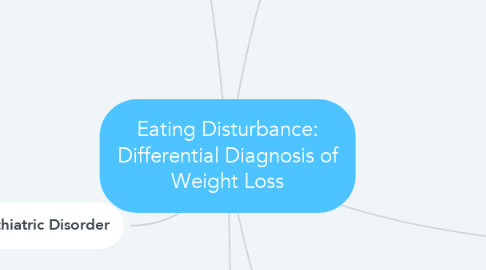
1. Other malignancies
2. Psychiatric Disorder
2.1. Depression
2.1.1. anorexia (loss of appetite) common symptom but no fear of weight gain
2.2. Schizophrenia
2.2.1. May have paranoid delusions about poisoned food but no fear of weight gain
2.3. Eating Disorder
2.3.1. Anorexia Nervosa
2.3.1.1. Self-induced weigh loss by dietary restriction, potentially with compensatory behaviours. Specific psychopathology of fear of weight gain.
2.3.1.2. BMI<17.5 or 15% expected. AN diagnosis given precedence over BN if below threshold
3. Behavioural Problem
3.1. Feeding Disorder
3.1.1. Most affects pre-school age children
3.1.1.1. 25%-45% of typically developing pre-school age children
3.1.1.2. Up to 80% of developmentally disabled children
3.1.2. Involves
3.1.2.1. Food refusal
3.1.2.2. disruptive mealtime behaviour
3.1.2.3. Rigid food preferences
3.1.2.4. Suboptimal growth
3.1.2.5. Failure to master self-feeding skills
4. Dysphagia (swallowing problems)
5. Gastrointestinal
5.1. Peptic (stomach) ulcer
5.2. Inflammatory Bowel Disease
5.2.1. Crohns Diesease
5.2.2. Ulcerative Colitis
5.3. Coeliac Disease
6. Symptom of Medical Condition
6.1. Most common causes
6.1.1. Bereavement
6.1.2. Stress
6.1.3. Hyperthyroidism (overactive thyroid) or Over-treating Hypothyroidism (underactive thyroid)
6.1.4. Cancer
6.1.4.1. Craniopharyngiomas
6.2. Less common causes
6.2.1. Endocrine
6.2.1.1. Addison's Disease
6.2.1.2. Uncontrolled Diabetes Mellitus
6.2.1.3. Pituitary Prolactinoma
6.2.2. Inflammatory
6.2.2.1. Rheumatoid Arthritis
6.2.2.2. SLE (Lupus)
6.2.3. Neurological
6.2.3.1. Dementia
6.2.4. Drug or Alcohol Misuse
6.2.5. Malnutrition
6.2.5.1. May be unable to communicate eating needs
6.3. Infection
6.3.1. Persistent Gastroenteritis
6.3.2. Tuberculosis
6.3.3. HIV/AIDS
6.3.4. Post viral
6.3.4.1. Chronic fatigue syndrome
6.3.4.1.1. food intake often poor

